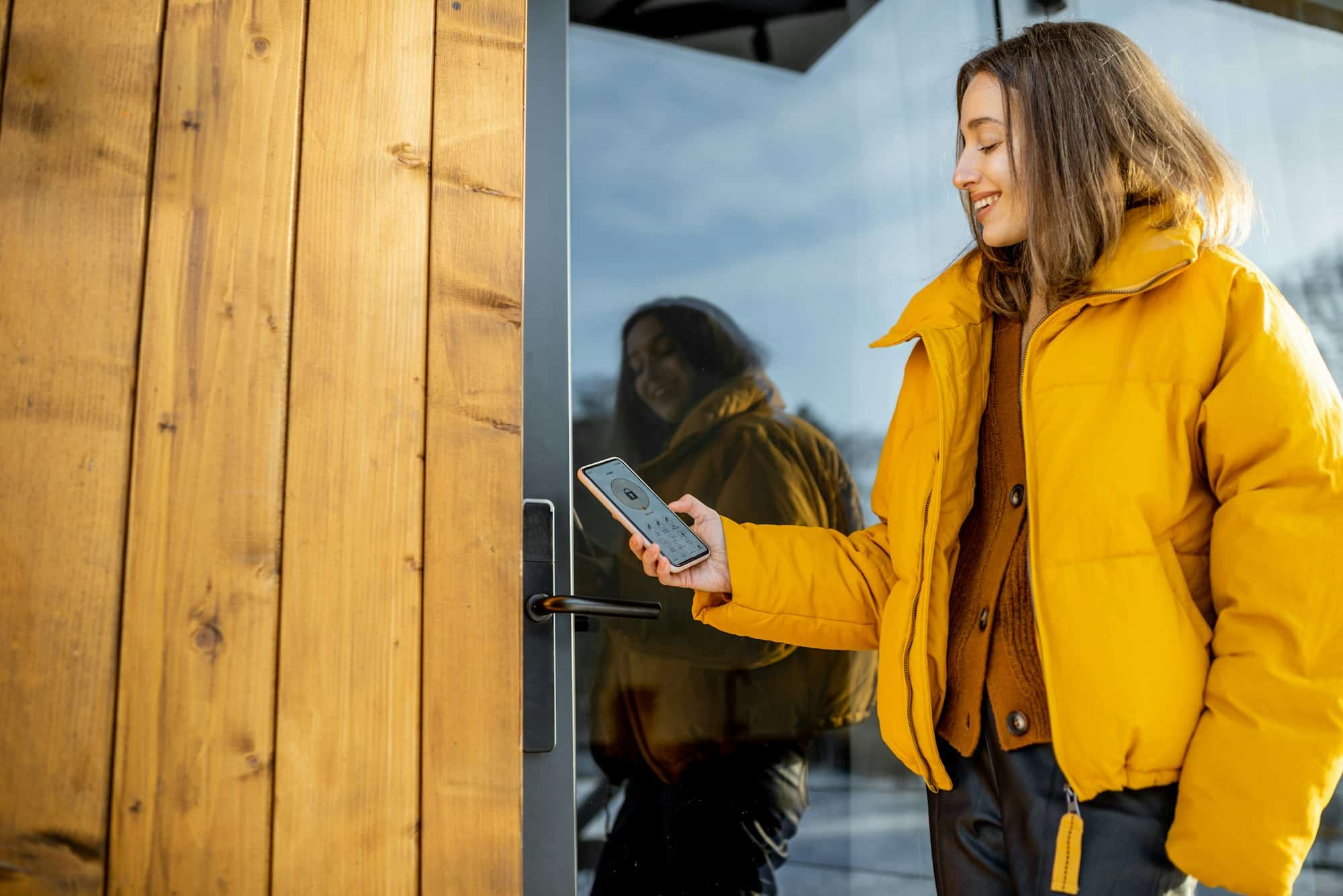What’s the Latest in Smart Lock Technology for Residential Security?

In today’s technologically advanced age, the need for home security is greater than ever before. One of the key elements that play a quintessential role in this regard is the humble door lock. This seemingly unassuming device has been revolutionized to keep pace with the times. The door lock has transformed from a simple mechanical device to a complex piece of electronic technology – a smart lock. This article aims to update you on the latest advancements in smart lock technology for residential security.
Smart Locks: The Cutting-Edge of Security
Gone are the days when you had to fumble for keys in your pocket or worry about losing them. Smart locks have made these issues a thing of the past. A smart lock is a device that locks and unlocks a door without the use of a traditional key. Instead, it relies on various forms of wireless protocol and electronic locking mechanisms, making it a secure, convenient, and keyless solution.
Cela peut vous intéresser : How to Use Virtual Coaching to Reach Fitness Goals in the Comfort of Your UK Home?
There are a variety of smart locks available on the market, each of them with their own unique features. Some smart locks work with a mobile app, allowing you to lock and unlock your door with a few taps on your smartphone. Others may have a keypad, allowing you to input a code for entry.
Moreover, smart locks can be integrated with various home automation systems, enhancing their functionality. For instance, integrating your smart lock with Amazon’s Alexa can allow you to control your lock with voice commands.
Sujet a lire : How to Build a Sustainable Wardrobe with Ethically Made UK Clothing Brands?
Top Smart Lock Brands: August, Yale, and More
When it comes to smart locks, there are a few key players in the market that stand out for their innovation, reliability, and overall performance. These include brands like August, Yale, and others.
August is renowned for its advanced features and ease of use. Notably, the August Wi-Fi Smart Lock offers compatibility with various platforms, including Apple HomeKit, Alexa, and Google Assistant. Its DoorSense feature also ensures that your door is securely closed and locked.
On the other hand, Yale, a brand with a long-standing history in the lock industry, offers a range of smart locks under its Assure line. Their latest offering, the Yale Assure Lock SL, is a sleek and keyless deadbolt that integrates with major smart home systems.
Key Features to Look for in a Smart Lock
When choosing a smart lock, consider some key features to ensure maximum security and convenience.
Firstly, look for a lock with strong compatibility. It should ideally work with the systems and devices you already have at home. If you have an Apple device, for instance, look for a smart lock that is compatible with Apple HomeKit.
Secondly, consider the method of access. Do you prefer to unlock your door using an app, a keypad, or both? Some locks also offer the option to unlock your door using a physical key as a backup.
Battery life is another important factor. Most smart locks run on batteries, and you wouldn’t want your lock to run out of power unexpectedly. A good smart lock will alert you when the battery is running low.
Lastly, make sure the smart lock you choose has a sturdy and secure bolt. A strong deadbolt can resist physical attacks and provide a higher level of security.
Smart Locks and Home Automation: The Future of Residential Security
Home automation is rapidly becoming a norm in modern households, and smart locks are a significant part of this trend. They not only offer enhanced security but also add a layer of convenience and sophistication to your home.
Integration with home automation systems allows you to control your smart lock remotely. You can lock or unlock the door from anywhere in the world, provided you have internet access. You can also set up routines, such as automatically locking the door at a certain time each night.
With compatibility with voice-controlled assistants like Amazon’s Alexa, you can even lock your door with a simple voice command. This level of convenience and control is truly the hallmark of smart lock technology.
Integrating Smart Locks: A Step-by-Step Guide
Now that you know what smart locks can do and what to look for in a smart lock, let’s delve into how to integrate one into your home. Here’s a general step-by-step guide:
-
Choose the Right Smart Lock: Based on the factors mentioned earlier, choose a smart lock that suits your needs and preferences.
-
Install the Smart Lock: Installation process differs from brand to brand. Some smart locks simply replace your current deadbolt, while others require a new hole to be drilled in your door. Ensure to follow the manufacturer’s instructions for a successful installation.
-
Set Up the App: Most smart locks come with a companion app that you’ll need to install on your smartphone. This app is where you’ll control most of the lock’s features, including adding access codes and setting up guest access.
-
Integrate with Home Automation: If your smart lock is compatible with your home automation system, integrate the two. This will allow you to control your lock along with your other smart home devices.
-
Test Your Lock: Once everything is set up, test your lock to ensure it’s working correctly. Check all features, including remote access, keypad functionality, and any other features your lock might have.
Remember, the goal of a smart lock is to enhance your home’s security while adding convenience. Choose a product that best fits your lifestyle and integrates seamlessly with your home’s existing technology.
While the integration of smart locks into our homes is still a new concept for some, the benefits they offer in terms of security, convenience, and smart home integration make them an increasingly popular choice for homeowners around the world.
Advanced Features: Fingerprint Reader, Auto Unlock, and More
As the competition among smart lock manufacturers heats up, brands are continually innovating to provide more advanced features to their customers. One of the most notable advancements in this field is the implementation of biometric technology in smart locks.
For instance, some smart locks now come with a fingerprint reader. This allows you to unlock your door by simply placing your finger on the lock. This feature not only enhances security but also adds a high level of convenience. Imagine the ease of not having to remember a pin code or reach for your phone to unlock your door!
Another exciting feature is the auto unlock function. This technology uses geofencing to detect when you’re approaching your home and automatically unlocks the door for you. It’s a useful feature for when you’re carrying heavy grocery bags and can’t manually unlock your door.
Moreover, some smart locks also offer a feature called "tamper alarm." This feature sets off an alarm if someone tries to tamper with the lock, adding an extra layer of security to your home.
Not to overlook, the integration of smart locks with smartwatches like the Apple Watch is another noteworthy advancement. It allows you to control your lock directly from your wrist, providing an even easier way to manage your home’s security.
Protecting Your Privacy and Data
Just like any other smart device, smart locks collect data. This includes information about who comes and goes, and when. While this can be helpful for security reasons, it also raises concerns about privacy and data protection.
To address these concerns, many smart lock manufacturers are taking steps to protect users’ data. Encryption is a common method used to secure data. This involves scrambling the data in a way that only authorized parties can understand.
Another measure is the use of two-factor authentication (2FA) for added security. This requires a second step of verification, such as a text message or email confirmation, in addition to entering your password or pin.
Furthermore, some manufacturers also offer the option to store your data locally on your device, instead of on a cloud server. This minimizes the risk of data breaches and gives users more control over their privacy.
In conclusion, with advancing technology and continuous innovation, smart locks are revolutionizing the way we secure our homes. From basic keyless entry to advanced features like fingerprint readers and auto-unlock, smart locks are becoming increasingly sophisticated. However, with the rise of smart devices, privacy and data protection have also emerged as crucial factors. Hence, when choosing a smart lock, not only consider its features and compatibility but also how well it protects your privacy and data. With the right smart lock, you can enjoy the benefits of security, convenience, and peace of mind.
